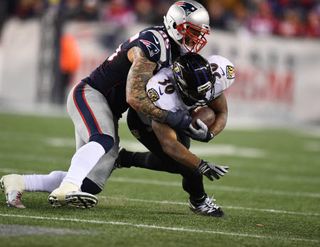Digital Distribution Could Drive Up Sports Fees

The battle for sports rights could heat up considerably this year as digital distribution becomes an increasingly viable option for professional leagues, according to Barclays media analyst Kannan Venkateshwar.
The first test of that theory could come with the upcoming renewal of broadcast rights for Thursday Night Football in 2018, the somewhat ratings-challenged National Football League offering that was split last season between CBS, NBC and the league’s own NFL Network. Venkateshwar believes that the emergence of digital TV providers and the possibility that the league might go direct to consumer with the games could drive up prices and affect other sports deals.
HOW LONG ON SIDELINES?
He’s not alone. Pivotal Research Group senior research analyst-advertising Brian Wieser also sees an opening in the sports fray for virtual MVPDs, but he thinks they’ll wait on the sidelines for now.
“I think the vMVPDs could very well become players in sports, but it seems likely they’ll want more scale before they do anything unique,” Wieser said. “However, the streaming SVOD services — which do have scale — are probably less likely to do anything, as sports is still mostly consumed live.”
There’s a potential wild card, Weiser said: Any service provider that might want to jump into the sports-rights arena merely has to write a check, and most have ample cash on hand.
“But I think it’s unlikely this would occur, as most of them seem to be relatively disciplined,” Wieser added.
Thursday Night Football would appear ripe for vMVPDs mainly because of ratings shortfalls last year that were blamed on poor matchups and competition with news networks during a contentious election year.
But if vMVPDs choose to wait, a lot of opportunities lie ahead over the next decade. Among the sports-rights contracts set to roll off are NBC Sports Group’s deal with the National Hockey League (2020); ESPN’s Monday Night Football deal (2021); ESPN, Fox and Turner’s agreement with Major League Baseball (2021); Sunday NFL games for CBS, Fox and NBC (2022); and DirecTV’s NFL Sunday Ticket deal (2022).
MoffettNathanson senior analyst Michael Nathanson said in a report that Amazon could be a digital participant in those deals, but vMVPDs could test the waters earlier, perhaps with Twitter’s expiring NFL streaming rights or Thursday Night Football.
Venkateshwar likened the possible entry of digital bidders to the emergence of Fox in the mid-1990s for NFL broadcast rights, followed by cable networks like ESPN and TNT bidding for major sports, events that helped drive rights fees into the stratosphere.
According to Venkateshwar, sports-league revenue has risen at a 7.5% annual clip for the NFL between 2010 and 2015, fueled by a 12.3% hike in rights fees. Other leagues have seem similar gains, with Major League Baseball rights fees climbing 15%, the National Basketball Association up 3.5% annually and even the NHL up 18.3% in the same time frame.
STREAMS COULD FLOW
Digital bidders are likely to serve more as spoilers in early rights negotiations, helping to drive up prices for the ultimate winners. But as technology improves — current live-streaming capacity can’t handle a major sports event like the Super Bowl, but could handle smaller, more targeted events on Twitter or Facebook — so do the opportunities.
“This could be one of the major considerations for leagues in the coming years given that the quality of experience is a major factor in their distribution decisions,” Venkateshwar wrote.
Multichannel Newsletter
The smarter way to stay on top of the multichannel video marketplace. Sign up below.
